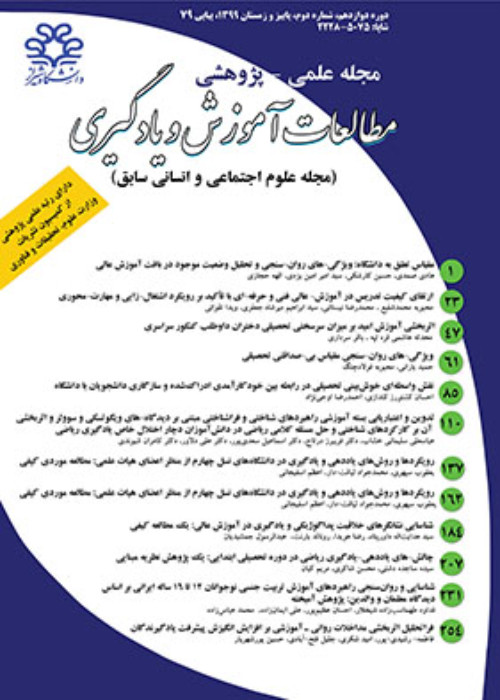Presenting of Structural Model for Achievement Goals & academic motivation with Academic Engagement: According to Mediator Role of Achievement Emotions
Author(s):
Article Type:
Research/Original Article (دارای رتبه معتبر)
Abstract:
Introduction
Students' academic achievement is considered a determining factor in assessing the quality of educational systems. Evidently, realization of this will not be possible without the full engagement of learners in academic activities. Recently, researchers have used the term ‘engagement’ to refer to ‘the quality of effort students themselves devote to educationally purposeful activities that contribute directly to desired outcomes’ (Hu & Kuh, 2002, p. 555). Academic engagement is a multi-dimensional structure: behavioral engagement, agentic engagement, cognitive engagement, and emotional engagement. The behavioral scale was designed to tap teachers’ perceptions of students’ effort, attention, and persistence during the initiation and execution of learning activities (Furrer & Skinner, 2007). Reeve and Tseng (2011, p.1) initially proposed the concept of agentic engagement. They defined it as “students’ constructive contribution into the flow of the instruction they receive”. Agentic engagement is similar to the other two aspects of engagement, as it is similarly a constructive student-initiated pathway to academic progress; but it is also meaningfully different. Conceptually, agentic engagement is a uniquely proactive and transactional type of engagement. Cognitive strategies involve the use of rehearsal, elaboration, and organizational strategies to increase encoding, retention, and comprehension of classroom materials (Weinstein & Mayer, 1986). Emotional engagement involves interest, boredom, happiness, anxiety, and other affective states, any of which could affect learners’ involvement in learning. Achievement goal theory has become one of the dominant frameworks for the conceptualization of achievement motivation in general, and motivation in school in particular (Elliot, 1999; Pintrich, 1994). Academic engagement is under the influence of several factors such as achievement goal, academic motivation and achievement emotions. Achievement goal theory was formulated out of several research programs that converged on the idea that students construe meanings for achievement situations, and that these meanings involve a comprehensive purpose for engagement in action, namely, achievement goal orientations (Maehr, 1984; Molden & Dweck, 2000). Moreover, academic motivation refers to the cause of behaviors that are in some way related to academic functioning and success, such as how much effort students put forth, how effectively they regulate their work, which endeavors they choose to pursue, and how persistent they are when faced with obstacles (Schunk et al. 2008). Atkinson and his colleagues (1957) formed the concept that achievement motivation that stems from two separate needs. One is the motivation to achieve, which is related to one’s desire to accomplish successful goals and the other is the motivation to avoid failure. In line with these studies, research is needed to investigate the relationship that achievement goals and academic motivation could have with academic engagement and the mediating role that achievement emotions could play in this regard.
Method
The statistical population of the study constituted the students of education and psychology, who engaged in the academic year 2016-2017 at Shiraz University. Participants were 315 college students (173 female and 142 male) in different fields and sections in the faculty of psychology and education at Shiraz University who were chosen through stratified random sampling. For measuring the variables, Academic Engagement Scale (Reeve and Tseng, 2011), achievement goals Questionnaire (Elliott and McGregor, 2001), Motivation Scale (Vallerand, 1989) and Achievement Emotions Questionnaire (Pekrun, 2005) were used. Fitness of the proposed model was examined through structural equation modeling (SEM), using AMOS-21 software package.
Results
Findings indicated that the proposed model fit the data properly. Better fit and more meaningful results were obtained by eliminating two insignificant paths. The results indicated that mastery-approach goals and performance-approach goals have significant positive effect on academic engagement. However, mastery-avoidance goals and performance-avoidance goals had no significant effect. On the other hand, intrinsic motivation was found to have a significant positive effect and extrinsic motivation had a significant negative impact on academic engagement, while amotivation had no significant effect. The results of the indirect relationship showed that achievement goals dimensions through negative emotions, and mastery-approach goals, mastery-avoidance goals and performance-approach goals through positive emotions have a significant indirect effect on academic engagement. Besides, the dimensions of academic motivation through positive emotions, intrinsic motivation and amotivation through negative emotions were found to have a significant indirect effect on academic engagement.
Discussion and Conclusion
Direct hypothesis examination indicated that: mastery goal approach could significantly predict Academic engagement, so that students with mastery goal approach had high academic engagement. Moreover, students with mastery goal approach focused on personal competence. Furthermore, such students enjoyed academic activities and welcomed challenging activities. Based on research findings, mastery-avoidance goal could not predict academic engagement. These students avoided defeat and error and left the tasks incomplete. Performance approach could also significantly predict academic engagement. These students were motivated by proving superiority over others and gaining favorable judgments about their progress. Similarly, intrinsic motivation could significantly and positively predict academic engagement. This might be because students with intrinsic motivation perform academic tasks spontaneously. On the other hand, extrinsic motivation could significantly and negatively predict academic engagement. These students fulfilled their academic tasks to obtain external rewards and reinforcements. Indirect hypothesis indicated that, positive academic motivation has a mediating role in the relationship that mastery goal approach, mastery-avoidance and performance approach have with academic engagement. Moreover, positive academic achievement has a mediating role in the relationship between intrinsic and extrinsic motivation and academic engagement.Keywords:
Language:
Persian
Published:
Studies in Learning & Instruction, Volume:10 Issue: 2, 2019
Pages:
33 to 53
magiran.com/p1951464
دانلود و مطالعه متن این مقاله با یکی از روشهای زیر امکان پذیر است:
اشتراک شخصی
با عضویت و پرداخت آنلاین حق اشتراک یکساله به مبلغ 1,390,000ريال میتوانید 70 عنوان مطلب دانلود کنید!
اشتراک سازمانی
به کتابخانه دانشگاه یا محل کار خود پیشنهاد کنید تا اشتراک سازمانی این پایگاه را برای دسترسی نامحدود همه کاربران به متن مطالب تهیه نمایند!
توجه!
- حق عضویت دریافتی صرف حمایت از نشریات عضو و نگهداری، تکمیل و توسعه مگیران میشود.
- پرداخت حق اشتراک و دانلود مقالات اجازه بازنشر آن در سایر رسانههای چاپی و دیجیتال را به کاربر نمیدهد.
دسترسی سراسری کاربران دانشگاه پیام نور!
اعضای هیئت علمی و دانشجویان دانشگاه پیام نور در سراسر کشور، در صورت ثبت نام با ایمیل دانشگاهی، تا پایان فروردین ماه 1403 به مقالات سایت دسترسی خواهند داشت!
In order to view content subscription is required
Personal subscription
Subscribe magiran.com for 70 € euros via PayPal and download 70 articles during a year.
Organization subscription
Please contact us to subscribe your university or library for unlimited access!



